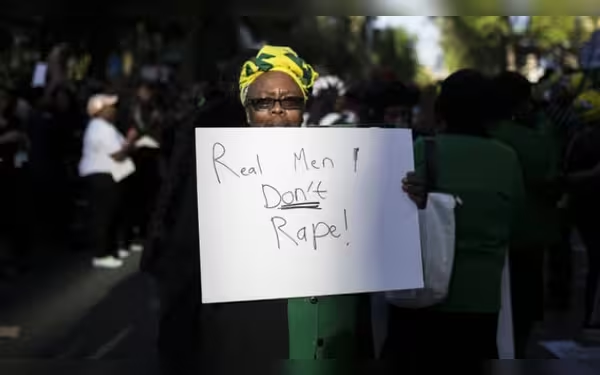Saturday, November 16, 2024 07:30 PM
Unicef Reports 79 Million Women and Girls Assaulted in Sub-Saharan Africa
- 79 million women and girls assaulted in sub-Saharan Africa.
- Sexual violence against children is a moral stain.
- Urgent action needed to protect vulnerable individuals.
 Image Credits: geo
Image Credits: geoUnicef reveals 79 million women and girls in sub-Saharan Africa have faced sexual violence, highlighting urgent need for protective measures.
In a shocking revelation, Unicef has reported that over 79 million women and girls in sub-Saharan Africa have faced the horrors of rape and sexual assault during their childhood. This alarming statistic highlights the grim reality that many young girls in this region endure, making it one of the most dangerous places in the world for them. The data, which was compiled from national records and international surveys conducted between 2010 and 2022, underscores the urgent need for action to protect these vulnerable individuals.
Unicef's Executive Director, Catherine Russell, expressed deep concern, stating, "Sexual violence against children is a stain on our moral conscience." This statement resonates with the gravity of the situation, as it reflects not only the physical harm inflicted upon these girls but also the long-lasting psychological trauma they endure. The report indicates that globally, around 370 million girls and women have been affected by sexual violence, with approximately one in five in sub-Saharan Africa experiencing such assaults before reaching the age of 18.
Claudia Cappa, Unicef's chief statistician, acknowledged the limitations of the data, noting that there are gaps and instances of under-reporting in some countries. However, she emphasized the importance of shedding light on this critical issue, stating, "We know the limitations, but we also wanted to finally give visibility to the issue through numbers." This visibility is crucial, as it can help mobilize resources and support for those affected.
Nankali Maksud, a regional child violence specialist based in Nairobi, described the situation as "terrifying," pointing out that it represents generations of trauma. She highlighted the challenges faced by girls who have experienced sexual violence, stating, "We're putting a lot of energy to push girls into school, but a girl who has been raped or gone through sexual assault is not able to learn." This underscores the broader implications of such violence, as it not only affects the immediate well-being of these girls but also their future opportunities.
The report also indicates that the highest numbers of assaults occur in regions plagued by conflict and insecurity. In places like Sudan, aid agencies have raised alarms about the heightened risks faced by girls and women amid ongoing violence. Russell pointed out, "Children in fragile settings are especially vulnerable to sexual violence," emphasizing the urgent need for protective measures in these areas. The use of rape and gender-based violence as weapons of war in conflict zones is a particularly harrowing aspect of this crisis.
First responders have reported that the number of cases documented is only a small fraction of the actual incidents, as many survivors are either unable or unwilling to seek help. This reality calls for a concerted effort to create safe spaces for survivors and to encourage reporting without fear of stigma or retribution.
The statistics presented by Unicef serve as a wake-up call for the global community. It is imperative that we come together to address the root causes of sexual violence and to provide support for those affected. By raising awareness and advocating for change, we can work towards a future where every girl can grow up free from the fear of violence and can pursue her dreams without hindrance. The time for action is now, and it is our collective responsibility to ensure that the voices of these young girls are heard and that their rights are protected.













